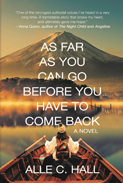
 |
In this novel, Young Carlie is the victim of her father’s sexual abuse. As she endures adolescence and keeps what her father does to her a secret, she develops a plan to reclaim her life. When she finds herself with seemingly unlimited access to her parents’ funds, Carlie determines that she will have her revenge. However, what she quickly learns is that no dollar amount can compensate for all that she has lost as a victim of her father’s abuse.
Carlie’s revenge leads her to make a harrowing decision that takes her out of the United States to Southeast Asia, where her future seems limitless. The move provides Carlie with the space to explore who she is as a person, but most importantly, it gives her the necessary environment to reconcile with her past and heal. After Carlie leaves the United States, nature becomes an integral force in her life. In chapters like “Sinking Down,” the relationship with nature that Carlie develops becomes clear. In fact, the role of nature is so important to her relationship with herself and with Japan specifically that it even determines her dreams. For example, Carlie describes how, as she fell asleep, she “floated in the middle of the ocean on a rudimentary raft” and saw a “pod of baby dolphins surrounded by the raft.” She describes watching the dolphins “as they swam, shrinking in order to sail through the spaces in the deck and back into the sea, where they grew.” The dolphins and their forward movement into the sea also serve as a metaphor for Carlie’s personal progress as she navigates life and develops as a person in Southeast Asia.
Readers meet the protagonist’s antithesis in Ava, a young woman who teaches English for Achieve English with Carlie. Ava is troubled and eventually commits suicide after multiple depressive bouts. Unlike Carlie, who found a new life and liberation in Japan, Ava had entered a downward spiral. One of the novel’s most tense moments is when Carlie has to call Ava’s family and tell them about her tragedy. This comes as a shock, as Ava’s family believed their daughter was a “perfectly happy little girl.” From this point, the book attempts to return to “a modicum of normalcy,” and it sees Carlie attempting to face the people who have caused her the most pain in her life—her own parents. These scenes reveal the novel’s psychological nature, and they also provide important anecdotes about one’s blood family and chosen family.
Hall's novel is gritty and real. It provides an in-depth look at the familial and non-familial circumstances that ultimately determine an individual’s course of action throughout their lives. It also examines how a place with which one is so unfamiliar can become a place in which an individual truly thrives and finds home. Most of all, it is an exploration of grief and the numerous ways in which it manifests in one’s life and the innumerable ways one can overcome it. This novel is a strong testament to what can happen when someone is determined to risk everything and pursue a better life.